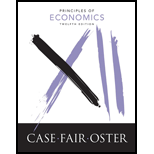
Principles of Economics (12th Edition)
12th Edition
ISBN: 9780134078779
Author: Karl E. Case, Ray C. Fair, Sharon E. Oster
Publisher: PEARSON
expand_more
expand_more
format_list_bulleted
Question
Chapter 19, Problem 1.4P
To determine
Identify the effects of flat tax and consumption tax.
Expert Solution & Answer
Want to see the full answer?
Check out a sample textbook solution
Students have asked these similar questions
• 3 different people working at any companies under the BPO industry in the Philippines.
• What are the 3 different Vision, Mission, Duties and Responsibilities and Career Path of these people in their companies under the BPO industry?
Module 6
⚫(1902) Buckner C X |
(1902) How to d x
(1902) Buckner F X
(1902) Productic X WP Videoplayer
Canvas Login | Ir x | +
Σ
R
mybrcc.instructure.com/courses/417310/discussion_topics/3420114?module_item_id=20155705
Spring 2025
Home
Announcements
Modules
Syllabus
Grades
8
People
BRCC-_Library
DLASC
Module 6 Discussion - Business Costs
Relaunch to update
For this discussion, think about where you work or a business you have a significant amount of knowledge about. What is a common
product that the business sells? What are the main costs the business has to incur in order to be able to sell that product? Which of these
costs are fixed and which are variable? How much additional costs would be incurred if it were to sell one additional unit of that product
(marginal cost)?
Write a discussion thread about this business, the product it commonly sells, and your answers to the above questions.
Also, respond to at least two threads created by your classmates. In these responses, share what…
Refer to the video to answer the following:
• what are all the key policies or all the strategies the Philippine government should prioritize to accelerate sustainable economic growth?
• these should consider the Philippines current economic challenges, including inflation, unemployment, and the need for digital transformation.
"The Philippines' Strong Economic Growth"
(YouTube link: https://youtu.be/1YtEoGp2ZeM?siJQfIv5kbu0txVsLL.)
Chapter 19 Solutions
Principles of Economics (12th Edition)
Knowledge Booster
Similar questions
- What are the 4 main parts of circular diagram?arrow_forwardWhat is absolute advantage?arrow_forwardGood Day, Kindly requesting assistance with this also Briefly explain how elasticity affects government health policies in the following cases:● Taxes on unhealthy products (cigarettes, alcohol, sugary drinks)● Subsidizing Preventive Care (e.g., vaccines, screenings)● Drug Price Controls & Generic Substitutions● Co-Payments & Insurance Designarrow_forward
- Good Day, Kindly assist with the following query: ● Cost–benefit Analysis● Cost-effectiveness analysis● Cost–utility analysis● Cost analysis or Cost Minimization Analysis For each of the following health policy questions listed below, identify and briefly explain which type of economic evaluation in question above would be most appropriate to use: ● The Ministry of Finance wants to know whether it is worth investing further resources into malaria control or building new primary schools? ● The Ministry of Health wants to compare the costs of receiving intravenous antibiotics in a hospital with receiving the same antibiotics (at the same doses) at home via a home health care service. ● The Ministry of Health wants to compare the costs and outcomes of two interventions for the treatment of early stage breast cancer: mastectomy without breast reconstruction compared to breast conserving surgery and radiotherapy (breast conservation). ● A malaria control programme wants to use economic…arrow_forwardSubstitute X=20. Can you show me how to do question 1 pleasearrow_forwardBlue Air Inc., has net sales of $740,000 and accounts receivables of $163,000. What is the firm's accounts receivables turnover?arrow_forward
- Please answer questions D-H, I have already answered A , B,C but it may help you to still solve them yourself. Thank you!arrow_forward2. A firm’s production function is given by:Q = 10KLThe unit capital and labour costs are 2 and 1 pounds respectively. The firm is contracted to produce2000 units.(a) Write out the optimisation problem of the firm. (b) Express this problem using a Lagrangian function. (c) Find values of K and L which fulfil the contract with minimal cost to the firm. (d) Calculate the total cost to the firm.arrow_forward3. Consider the following estimated regression equation, estimated using a sample of firms, where RDis total firm spending on research and development in USD ($), Revenue is total firm revenuein USD ($), and W ages is the firms’ total spending on wages in USD ($) (standard errors inparentheses):RDd = 1000(600)+ 0.5(0.1)Revenue + 1.5(0.5)W ages,(a) Interpret the coefficients on each of the explanatory variables. (b) Which of the three coefficients are statistically significant at the 5% level of significance? Howdo you know? A researcher runs a two-sided statistical test of the null hypothesis that both the coefficients onthe explanatory variables above are jointly equal to 0.25 (mathematically, that β1 = β2 = 0.25),and reports a p-value of 0.045.(c) What does this p-value mean for the outcome of the test? (d) What would an appropriate two-sided alternative hypothesis look like?arrow_forward
arrow_back_ios
SEE MORE QUESTIONS
arrow_forward_ios
Recommended textbooks for you

 Economics (MindTap Course List)EconomicsISBN:9781337617383Author:Roger A. ArnoldPublisher:Cengage Learning
Economics (MindTap Course List)EconomicsISBN:9781337617383Author:Roger A. ArnoldPublisher:Cengage Learning





Economics (MindTap Course List)
Economics
ISBN:9781337617383
Author:Roger A. Arnold
Publisher:Cengage Learning



